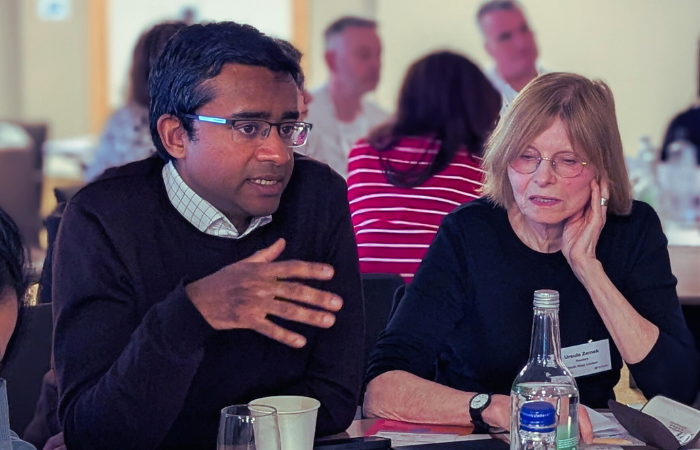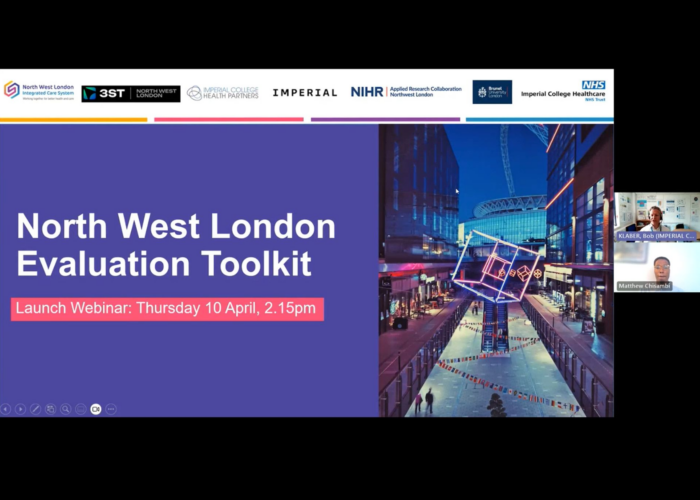Kyle Lee-Crossett, Innovation Advisor, reflects on how an innovative Eating Disorder service is transforming care for patients in NWL and across the country.

Eating disorders are a serious mental illness that affect over a million people in the UK, and have the highest mortality rate of any mental health disorder. And we know that peak onset of these illnesses is in adolescence and young adulthood. Dove recently shared a powerful new campaign about the real story of a young woman in recovery from an eating disorder, highlighting just how traumatic an eating disorder can be both for the person suffering from one, and those that love them. A (year) survey by eating disorder charity Beat found people with lived experience of eating disorders described being “bombarded” by triggering online content which encouraged and exacerbated their eating disorders.
This isn’t a new problem and it’s an illness the health service and charity sector have been working to end. And for those suffering now, ensuring patients can access the right treatment in the right place at the right time is a priority.
And for eating disorders, “the right time” could not be more crucial. Research tells us that we should be trying to reach someone with an eating disorder within the first three years of the illness. The longer a young person is unwell, the more likely it is that changes to the brain will occur and persist, as well as extending the period that people who have eating disorders are likely to experience disruptions to social, educational and emotional development.
Early intervention: treating people as soon as possible
One brilliant early intervention service we’ve been working with partners across NWL on is the First Rapid Early Intervention for Early Eating Disorders (FREED) programme. Research tell us that early intervention can lead to better treatment outcomes, but accessing timely support can be a challenge for young people. FREED targets this challenge by providing a rapid-access early intervention treatment model for young people aged 16-25 who are experiencing eating disorder symptoms. It’s a flexible, evidence-based treatment focused on early intervention, making it much more effective than traditional treatments at reversing the changes to brain, body and behaviour caused by eating disorders.
With FREED, the goal is for treatment to start within 4 weeks of referral to an eating disorder service. Initially developed and tested by the South London and Maudsley NHS Foundation Trust’s Eating Disorders Unit and King’s College London in 2014-15, since 2020 we’ve been working with NHS trusts in our patch to roll out across NWL.
Making an impact in NWL
Between December 2020and April 2023, we worked with two adult eating disorder services in NWL to implement and improve FREED: Central and North West London NHS Foundation Trust (CNWL) and West London NHS Trust (WLT). CNWL was an early adopter of FREED and has offered the service to 17-25 year-olds since 2016, while WLT launched FREED for 17-19 year-olds in March 2022 and expanded its offer to 19-21 year-olds in February 2023.
We supported our local eating disorder services to embed the FREED offer within their services and reach young people in the region who need their help. This included working with the two NHS trusts to design tools for waitlist interventions, reviewing the demographics of the patients the service had seen to ensure there were no potential disparities or gaps in outreach and developing a Standard Operating Procedure (SOP) to ensure staff resource was optimised.
In total 451 patients were referred to FREED in NWL between January 2019 and March 2023 – 259 of which were able to start treatment (similar to the national trend in drop-off from referral to treatment). While the decrease in partients referred to those who start treatment needs to decrease, this still means 259 patients were able to get access to treatment faster. At CNWL, a call up to 48 hours after being referred to FREED was delivered to 100% of patients and a 2-week assessment after being referred was hit 95% of the time, with the mean number of days for an assessment being only 9. Nationally, 30% of young people referred for ED treatment wait over 18 weeks and another 34% over six months, with many seeing their conditions worsen during that wait.
Staff working to deliver the service told us they were able to see the benefit of FREED to patients quickly – with patients improving much more rapidly than treating clients with long-enduring eating disorders. Using the FREED service was a positive experience for patientsand staff, and staff involved told us they wanted the programme to continue.
Evaluation from the national roll-out of FREED have shown that compared to treatment as usual, young people who received treatment on a FREED pathway recovered quicker and required less intensive treatment.
Sustaining and expanding a service that works
We know already that this is a service that really works – patients get seen faster and this can support them to get better quicker. So how do we sustain this?
Following the wrap-up of the national roll-out in April, we held an online event for ED services, the Integrated Care Board (ICB), and other local stakeholders to reflect on and capture learning from adopting FREED in NWL. Delegates used their experience of delivering FREED and working across the local mental health landscape to reflect on the roll-out and to co-develop a list of recommendations to sustain and expand positive outcomes for young people with eating disorders in NWL.
Eating disorders don’t discriminate, but some groups and populations are regularly not reached by eating disorder services. In 2023/24, the programme plans to continue outreach to underrepresented groups and particularly to understand how Covid may have impacted ED prevalence. Another priority is engaging with primary and secondary care to connect the system and enable collaboration, as well as working with Communications teams to reach and then treat more young people.
It’s clear that early intervention is crucial in effectively treating eating disorders. FREED is the only clinically-proven early intervention programme, and our roll-out in NWL has demonstrated just how effective this approach. We want to ensure young people with eating disorders get treatment as early as possible to recover as quickly as possible, and FREED is an important step towards that goal.
To hear more about FREED, please visit their website. If you have any queries about the roll out of FREED in NWL, please get in touch with Kyle Lee-Crossett, Innovation Advisor.



